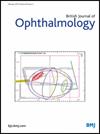Reactivation of retinopathy of prematurity after anti-VEGF treatment: a review
IF 3.5
2区 医学
Q1 OPHTHALMOLOGY
引用次数: 0
Abstract
Anti-vascular endothelial growth factor (anti-VEGF) agents have demonstrated efficacy and short-term safety in the treatment of retinopathy of prematurity (ROP), establishing them as the preferred option for zone I and zone II posterior disease. Despite their advantages, the effects of anti-VEGF agents are relatively temporary. Consequently, ROP may reactivate or recur if retinal vascularisation has not sufficiently progressed and significant areas of avascular anterior retina remain while the anti-VEGF agents are cleared from the vitreous cavity. Extreme prematurity, early onset of ROP and severe disease at baseline (aggressive ROP or zone I disease) significantly increase this risk. Reactivated ROP presents differently from initial ROP presentation and may be subtle on clinical examination; however, it can often be detected earlier with fluorescein angiography. The interval and rates of reactivation vary depending on the type and dose of anti-VEGF agents, with occurrences sometimes delayed for years after an initial quiescent period. This necessitates close follow-up after anti-VEGF monotherapy until retinal vascularisation is complete or laser treatment is administered to the persistent peripheral avascular retina. On reactivation, the condition may be managed with repeat injections or laser treatment. Repeated anti-VEGF injections pose risks, including vascular arrest, persistent avascular retina, endophthalmitis and systemic toxicity. Late-detected reactivations or cases unresponsive to initial treatments may require vitrectomy. Generally, retreatment leads to disease regression with favourable structural outcomes. Currently, longer-acting drugs and prophylactic laser treatment of the avascular anterior retina are the only supported strategies for reducing reactivation.抗vegf治疗后早产儿视网膜病变的再激活:综述
抗血管内皮生长因子(anti-VEGF)药物治疗早产儿视网膜病变(ROP)的有效性和短期安全性已得到证实,这使其成为I区和II区后路疾病的首选药物。尽管有这些优点,抗vegf药物的作用是相对暂时的。因此,如果视网膜血管化没有充分进展,当抗vegf药物从玻璃体腔中清除时,视网膜前无血管的大片区域仍然存在,ROP可能会重新激活或复发。极端早产、早发性ROP和基线时的严重疾病(侵袭性ROP或I区疾病)显著增加了这种风险。重新激活的ROP与最初的ROP表现不同,在临床检查中可能很微妙;然而,它通常可以通过荧光素血管造影早期检测到。再激活的时间间隔和速率取决于抗vegf药物的类型和剂量,有时在初始静止期后延迟数年。这需要在抗vegf单药治疗后密切随访,直到视网膜血管化完成或对持续性周围无血管视网膜进行激光治疗。重新激活后,病情可以通过重复注射或激光治疗来控制。反复注射抗vegf存在风险,包括血管停搏、持续无血管视网膜、眼内炎和全身毒性。晚期发现的复发或对初始治疗无反应的病例可能需要玻璃体切除术。一般来说,再治疗导致疾病消退,并有良好的结构结果。目前,长效药物和预防性激光治疗无血管前视网膜是唯一支持减少再激活的策略。
本文章由计算机程序翻译,如有差异,请以英文原文为准。
求助全文
约1分钟内获得全文
求助全文
来源期刊
CiteScore
10.30
自引率
2.40%
发文量
213
审稿时长
3-6 weeks
期刊介绍:
The British Journal of Ophthalmology (BJO) is an international peer-reviewed journal for ophthalmologists and visual science specialists. BJO publishes clinical investigations, clinical observations, and clinically relevant laboratory investigations related to ophthalmology. It also provides major reviews and also publishes manuscripts covering regional issues in a global context.

 求助内容:
求助内容: 应助结果提醒方式:
应助结果提醒方式:


